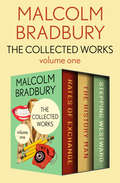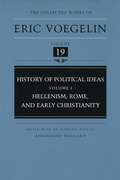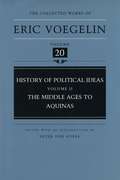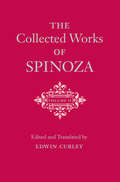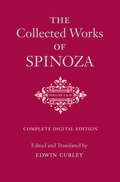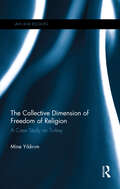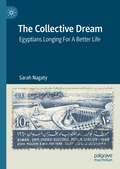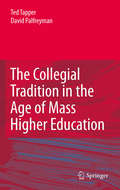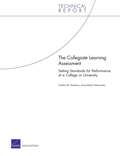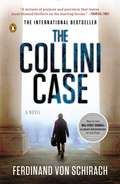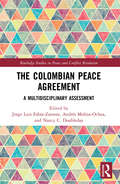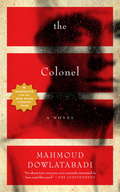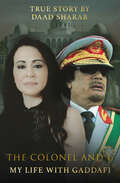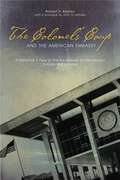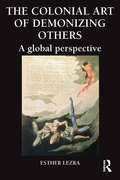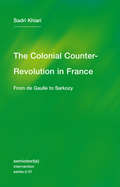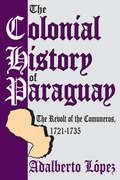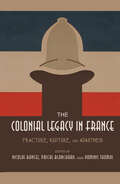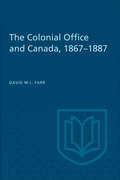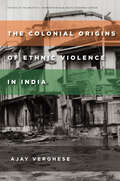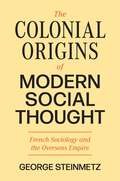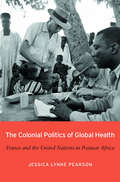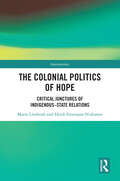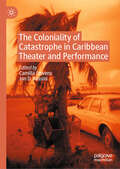- Table View
- List View
The Collected Works Volume One: Rates of Exchange, The History Man, and Stepping Westward
by Malcolm BradburyThree satires of academia by the beloved British critic, teacher, and novelist—including his “outstanding” comic masterpiece, The History Man (The Guardian). “A satirist of great assurance and accomplishment,” Malcolm Bradbury remains one of the sharpest comic novelists of the twentieth century (The Observer). In Rates of Exchange and Stepping Westward, as “in almost all of Bradbury’s novels, the most frequently recurring theme is that of the slightly naïve, liberal innocent, usually an academic, hilariously abroad in an unfamiliar, and occasionally slightly threatening, context” (The Guardian). In The History Man, the tables are turned, and the professor himself is the threat, resulting in “grim wit, chill comedy and a fictional energy which is as imaginative as the tale is shocking” (A. S. Byatt). Rates of Exchange: University lecturer and seasoned international traveler Angus Petworth is unprepared for the oddities of culture and circumstance that await him on the other side of the iron curtain—in the eastern European nation of Slaka. In two eventful weeks, the professor gives an incendiary interview, is seduced by a femme fatale, and becomes embroiled in a plot of international intrigue. Satirizing everything from critics and diplomats to Marxism and academia, Rates of Exchange is a witty and lighthearted novel of cultural interchange at the height of the Cold War, shortlisted for the Man Booker Prize. “Explosively funny.” —The Daily Telegraph The History Man: Bradbury’s classic skewering of 1970s academia and ideological hypocrisy centers around Professor Howard Kirk, who prides himself on being the most highly evolved teacher on campus. But beneath Kirk’s scholarly bohemianism and studied cool is a ruthless, self-serving Machiavellian streak. Kirk is vain and bigoted, dismissing female students and colleagues while releasing vitriol against those who contradict him, particularly his clever, wayward wife, Barbara, the long-suffering mother of his two children. Someone needs to teach him a lesson . . . “[A] genuinely comic novel.” —The New York Times Stepping Westward: At the height of the swinging sixties, mediocre British writer James Walker accepts an academic post in America for a year he’ll never forget. As Benedict Arnold University’s writer in residence, he finds himself something of a celebrity—his work, though met with shrugs at home, is the subject of vibrant scholarly criticism among American academics. But the buttoned-up professor is about to take a crash course in culture shock taught by spirited advocates of free love and aggressively ambitious colleagues. “Highly entertaining.” —Margaret Drabble, The Sunday Times
The Collected Works of Eric Voegelin Volume 19: Hellenism, Rome, and Early Christianity
by Eric Voegelin Athanasios MoulakisIn Hellenism, Rome, and Early Christianity, Voegelin demonstrates that the "spiritual disintegration" of the Hellenic world inaugurated a long process of transition in the self- understanding of Mediterranean and European man. The reflections that emerge remain universal concerns regarding the order of human existence in society and history. Although one may come to different conclusions, Voegelin's responses to the problems of the period suggest avenues of investigation that are still little traveled.
The Collected Works of Eric Voegelin Volume 20: The Middle Ages to Aquinas
by Peter Von Sivers Eric VoegelinHistory of Political Ideas contains both analyses of themes Voegelin developed in his later works and discussions of authors and ideas to which he did not return or which he later approached from a different angle and with a different emphasis. The Middle Ages to Aquinas has withstood the test of time. What makes it still highly valuable is its thoroughly revisionist approach, cutting through all the convenient cliches and generalizations and seeking to establish the experiential underpinnings that typified the medieval period.
The Collected Works of Spinoza, Volume II: One-volume Digital Edition
by Benedictus de SpinozaThe second and final volume of the most authoritative English-language edition of Spinoza's writingsThe Collected Works of Spinoza provides, for the first time in English, a truly satisfactory edition of all of Spinoza's writings, with accurate and readable translations, based on the best critical editions of the original-language texts, done by a scholar who has published extensively on the philosopher's work.The centerpiece of this second volume is Spinoza’s Theological-Political Treatise, a landmark work in the history of biblical scholarship, the first argument for democracy by a major philosopher, and a forceful defense of freedom of thought and expression. This work is accompanied by Spinoza’s later correspondence, much of which responds to criticism of the Theological-Political Treatise. The volume also includes his last work, the unfinished Political Treatise, which builds on the foundations of the Theological-Political Treatise to offer plans for the organization of nontyrannical monarchies and aristocracies.The elaborate editorial apparatus—including prefaces, notes, glossary, and indexes—assists the reader in understanding one of the world’s most fascinating, but also most difficult, philosophers. Of particular interest is the glossary-index, which provides extensive commentary on Spinoza’s technical vocabulary.A milestone of scholarship more than forty-five years in the making, The Collected Works of Spinoza is an essential edition for anyone with a serious interest in Spinoza or the history of philosophy.
The Collected Works of Spinoza, Volumes I and II: One-Volume Digital Edition
by Benedictus de SpinozaThe Collected Works of Spinoza: Complete Digital Edition, combining volumes I and II, provides for the first time in English, a truly satisfactory edition of all of Spinoza's writings, with accurate and readable translations, based on the best critical editions of the original-language texts, done by a scholar who has published extensively on the philosopher’s work.The first volume contains Spinoza’s single most important work, the Ethics, and four earlier works: the Treatise on the Emendation of the Intellect, the Short Treatise on God, Man, and His Well-Being, Descartes’ "Principles of Philosophy," and Metaphysical Thoughts. Also included are Spinoza’s letters from the periods when these works were being written.The centerpiece of the second volume is Spinoza’s Theological-Political Treatise, a landmark work in the history of biblical scholarship, the first argument for democracy by a major philosopher, and a forceful defense of freedom of thought and expression. This work is accompanied by Spinoza’s later correspondence, much of which responds to criticism of the Theological-Political Treatise. The volume also includes his last work, the unfinished Political Treatise, which builds on the foundations of the Theological-Political Treatise to offer plans for the organization of nontyrannical monarchies and aristocracies.The elaborate editorial apparatus—including prefaces, notes, glossary, and indexes—assists the reader in understanding one of the world’s most fascinating, but also most difficult, philosophers. Of particular interest is the glossary-index, which provides extensive commentary on Spinoza’s technical vocabulary.A milestone of scholarship more than forty-five years in the making, The Collected Works of Spinoza is an essential edition for anyone with a serious interest in Spinoza or the history of philosophy.
The Collective Dimension of Freedom of Religion: A Case Study on Turkey (Law and Religion)
by Mine YıldırımThe right to freedom of religion or belief, as enshrined in international human rights documents, is unique in its formulation in that it provides protection for the enjoyment of the rights "in community with others". This book explores the notion of the collective dimension of freedom of religion or belief with a view to advance the protection of this right. The book considers Turkey which provides a useful test case where both the domestic legislation can be assessed against international standards, while at the same time lessons can be drawn for the improvement of the standard of international review of the protection of the collective dimension of freedom of religion or belief. The book asks two main questions: what is the scope and nature of protection afforded to the collective dimension of freedom of religion or belief in international law, and, secondly, how does the protection of the collective dimension of freedom of religion or belief in Turkey compare and contrast to international standards? In doing so it seeks to identify how the standard of international review of the collective dimension of freedom of religion can be improved.
The Collective Dream: Egyptians Longing For A Better Life
by Sarah NagatyThis book links two seminal moments in Egypt’s history – the Revolution of 25th January 2011 and the presidency of Gamal Abdel Nasser – through various cultural manifestations. It conceives the concept of “collective dreaming” to map out the subliminal feeling which runs deep through experiences of socially transformative moments. The author has extensively studied the structure of feelings that encompasses the experiences not only of activist minorities but the broader mass of revolutionary movements. In certain historical moments, hopes and aspirations bind together millions of people from all walks of life: students, workers, farmers, and middle-class professionals. Nagaty calls this phenomenon the “collective dream”, something which has been carried through generations of Egyptians. The book will be of interest to students and scholars of social movement studies, cultural studies and cultural sociology.
The Collegial Tradition in the Age of Mass Higher Education
by David Palfreyman Ted TapperThis book will examine the relationship between collegiality and the collegial tradition in the context of the development of mass higher education. The collegial tradition in higher education has been shaped above all by the collegiate universities. In all its various forms (as commensality, as a mode of governance, and as a critical force in shaping the process of teaching, learning and research) the collegial tradition has found sustenance in many sectors of higher education. It may well be that the tradition as expressed in these forms now has more strength and depth in the non-collegiate than in the collegiate universities. This work will give a fuller picture of the present-day character of British (especially English) higher education. Although this is a book that will rely particularly upon the Oxford experience of collegiality, there will be extensive comparative and international reference to the idea of collegiality, the various challenges to it that have emerged within different national systems, and the contrasting patterns of adjustment to those challenges.
The Collegiate Learning Assessment
by Chaitra M. Hardison Anna-Marie VilamovskaThe Collegiate Learning Assessment (CLA) is a measure of how much students' critical thinking improves after attending college or university. This report illustrates how institutions can set their own standards on the CLA using a method that is appropriate for the CLA's unique characteristics.
The Collini Case
by Ferdinand Von SchirachThe internationally bestselling courtroom drama centering on a young German lawyer and a case involving World War II A bestseller in Germany since its 2011 release--with rights sold in seventeen countries--The Collini Case combines the classic courtroom procedural with modern European history in a legal thriller worthy of John Grisham and Scott Turow. Fabrizio Collini is recently retired. He's a quiet, unassuming man with no indications that he's capable of hurting anyone. And yet he brutally murders a prominent industrialist in one of Berlin's most exclusive hotels. Collini ends up in the charge of Caspar Leinen, a rookie defense lawyer eager to launch his career with a not-guilty verdict. Complications soon arise when Collini admits to the murder but refuses to give his motive, much less speak to anyone. As Leinen searches for clues he discovers a personal connection to the victim and unearths a terrible truth at the heart of Germany's legal system that stretches back to World War II. But how much is he willing to sacrifice to expose the truth?
The Colombian Peace Agreement: A Multidisciplinary Assessment (Routledge Studies in Peace and Conflict Resolution)
by Jorge Luis Fabra-ZamoraThis book is the first systematic, interdisciplinary examination of the peace agreement signed between the Colombian Government and the Revolutionary Armed Forces of Colombia to end one of the largest and most violent conflicts in the Western Hemisphere. It discusses the achievements, failures, and challenges of this innovative peace agreement and its implications for Colombia’s future. Contributors include negotiators of the Agreement, judges of the Special Jurisdiction for Peace, representatives of the civil society, and leading academic experts in peace studies, human rights, international law, criminal law, transitional justice, political science, and philosophy. Based on the premise that peace is a form of transferable social knowledge, and therefore necessitates transformative social learning, the volume also discusses what other countries can learn from the Colombian experience. This book will be of much interest to students of peace and conflict studies, transitional justice, Latin American politics, human rights, civil wars and International Relations.
The Colonel
by Mahmoud Dowlatabadi Tom PatterdaleA new novel by the master of Iranian letters that directly engages politics in Iran today Ten years in the writing, this fearless novel--so powerful it's banned in Iran--tells the stirring story of a tortured people forced to live under successive oppressive regimes. It begins on a pitch black, rainy night, when there's a knock on the Colonel's door. Two policemen have come to summon him to collect the tortured body of his youngest daughter. The Islamic Revolution is devouring its own children. Set over the course of a single night, the novel follows the Colonel as he pays a bribe to recover his daughter's body and then races to bury her before sunrise. As we watch him struggle with the death of his innocent child, we find him wracked with guilt and anger over the condition of his country, particularly as represented by his own children: a son who fell during the 1979 revolution; another driven to madness after being tortured during the Shah's regime; a third who went off to martyr himself fighting for the ayatollahs in their war against Iraq; one murdered daughter, and another who survives by being married to a cruel opportunist.An incredibly powerful novel about nation, history and family, The Colonel is a startling illumination of the consequences of years of oppression and political upheaval in Iran.From the Trade Paperback edition.
The Colonel and I: My Life with Gaddafi
by Daad SharabAn insider&’s view of Libya&’s fallen dictator by the woman who served as his longtime troubleshooter and confidante. For almost half of Muammar Gaddafi&’s forty-two-year reign, Daad Sharab was his trusted confidante—the only outsider to be admitted to his inner circle. Down the years many have written about Gaddafi, but none have been so close. Now, years after the violent death of &“the Colonel,&” she gives a unique insight into the character of a man of many contradictions: tyrant, hero, terrorist, freedom fighter, womanizer, father figure. Her account is packed with fascinating anecdotes and revelations that show Gaddafi in a surprising new light. Daad witnessed the ruthlessness of a flawed leader who is blamed for ordering the Lockerbie bombing, and she became the go-between for the only man convicted of the atrocity. She does not seek to sugar-coat Gaddafi&’s legacy, preferring readers to judge for themselves, but also observed a hidden, more humane side. The leader was a troubled father and compassionate statesman who kept sight of his humble Bedouin roots, and was capable of great acts of generosity. The author also pulls no punches about how Western politicians such as Tony Blair, George Bush, and Hillary Clinton shamelessly wooed his oil-rich regime. Despite her warnings the dictator was ultimately consumed by megalomania, and Daad was caught up in his dramatic fall. Falsely accused by Gaddafi&’s notorious secret service of being both the Colonel&’s mistress and a spy, she faced betrayal and imprisonment—and, caught up in the Arab Spring uprising, she also faced a fight for her life as bombs rained down on Libya.
The Colonels’ Coup and the American Embassy: A Diplomat’s View of the Breakdown of Democracy in Cold War Greece (ADST-DACOR Diplomats and Diplomacy Series)
by John O. Iatrides Robert V. KeeleyRobert Keeley was a Foreign Service officer stationed in Greece during one of the most tumultuous events in the country’s history, the so-called Colonels’ coup of April 21, 1967. This is his insider’s account of how U.S. policy was formulated, debated, and implemented from 1966 to 1969, the critical years directly before and after the coup. A major event in the history of the Cold War, the coup ushered in a seven-year period of military rule in Greece. In its wake, some eight thousand people affiliated with the Communist Party were rounded up, and Greece became yet another country where the fear of Communism led the United States into alliance with a repressive right-wing authoritarian regime. In military coups in some other countries, it is known that the CIA and other agencies of the U.S. government played an active role in encouraging and facilitating the takeover. The Colonels’ coup, however, came as a surprise to the United States (which was expecting a Generals’ coup instead). Yet the U.S. government accepted it after the fact, despite internal disputes within policymaking circles about the wisdom of accommodating the upstart Papadopoulos regime. Keeley was among those dissenters.
The Colonial Art of Demonizing Others: A Global Perspective (Global Horizons Ser.)
by Esther LezraThe Colonial Art of Demonizing Others examines European mistranslations and misrepresentations of black freedom dreams and self-activity as monstrous in the period of modern imperial consolidation –roughly from 1750 to 1848. This book argues that Europe’s archives of self-understanding are haunted by the traces of Black radical resistance. Just as Europe’s economy came to depend upon the raw materials, markets, and labor it secured from the colonies, European culture came to be based on fantasies and phobias derived from the unruly and unmanageable aftershocks of colonial violence and counter-insurgency. Rather than assert that European nationalist and abolitionist discourses are on the side of emancipatory movements, the book shows the limits of the promise of that discourse, and the continuation of those limitations that makes the continued pursuit of that promise a questionable activity. This book does not wish to salvage the emancipatory promises of European discourse, but considers the more difficult and uncomfortable question of why emancipatory movements represented the struggles of anticolonial and radical blackness the way they did. The Colonial Art of Demonizing Others privileges the political reading not only of literary texts but also of historical documents and visual culture.
The Colonial Counter-Revolution: From de Gaulle to Sarkozy (Semiotext(e) / Intervention Series #30)
by Sadri KhiariHow and when American-style slavery created the racial system, not just in the United States but internationally."We see the hatred we elicit, Islamophobia, Negrophobia; we see police numbers increase, repression spread, mechanisms of control and surveillance strengthened, structures of corruption and cronyism flourish, and bodies of institutionalization, integration, and supervision develop, but we do not see the cause, or one of the causes, which is none other than the threat that we now pose to the white order."--from The Colonial Counter-RevolutionJust as Capital produced classes and patriarchy produced genders, colonialism produced race. In The Colonial Counter-Revolution, Sadri Khiari outlines how and when American-style slavery created the racial system, not just in the United States but internationally, and why the development of relationships of equality within the white community favored the crystallization of specifically racial social relations. More than just a response to the dialogue, debate, and trauma of immigration today, this book looks beyond the right/left dichotomy of the issue in politics to the more fundamental political existence of immigrants and Blacks, who must exist politically if they are to exist whatsoever. Race is not biological: race is political. And it is the manifestation of the colonial counter-revolution. In France, that counter-revolution started with General de Gaulle, and continues today, where the anti-colonialist fight of Palestinian Arabs and the anti-racist fight of Arabs and blacks in France have the same adversary: white Western domination.
The Colonial History of Paraguay: The Revolt of the Comuneros, 1721-1735
by Adalberto LópegThe Paraguayan revolt of 1721-1735 was the first of sev-eral events that presaged the Hispanic American Inde-pendence movements of the early nineteenth century. Exist-ing works on the revolt, though, are either too short, superficial, or inaccurate. The Colonial History of Paraguay is an original contribution to the scholarship on this crucial period in Paraguay's history. More than a detailed account of the revolt, the work provides an overview of Paraguay in the sixteenth and seventeenth centuries, combining politics, eco-nomics, and social analysis into an integrated whole. It is the first modern study of a little-known yet significant portion of Hispanic-American history.
The Colonial Hotel: A Novel
by Jonathan BennettThis devastating tale of love and war is &“in Graham Greene territory . . . A solid novel on morality in our not-quite-postcolonial world&” (The Globe and Mail, Toronto). A doctor and a nurse, Paris and Helen, are doing humanitarian work in a nation on the brink of civil war. They have also fallen in love with each other—and Helen is pregnant with their child. Then, a confrontation breaks out and they are swept up by rebel forces and separated. One is imprisoned while the other escapes. In The Colonial Hotel—which recasts a classic story of ancient Greece into a modern setting—we learn of their fates, in a brutally powerful story of family, forgiveness, and identity. &“An exploration of love and grief, the power of storytelling, the pains of parenthood and uncomfortable truths . . . Bennett has cleverly and sensitively described the many types of love tested by war . . . Rewarding and intensely moving . . . Devastatingly beautiful.&” —National Post
The Colonial Legacy in France: Fracture, Rupture, and Apartheid
by Dominic Thomas Nicolas Bancel Pascal Blanchard Alexis PernsteinerDebates about the legacy of colonialism in France are not new, but they have taken on new urgency in the wake of recent terrorist attacks. Responding to acts of religious and racial violence in 2005, 2010, and 2015 and beyond, the essays in this volume pit French ideals against government-sponsored revisionist decrees that have exacerbated tensions, complicated the process of establishing and recording national memory, and triggered divisive debates on what it means to identify as French. As they document the checkered legacy of French colonialism, the contributors raise questions about France and the contemporary role of Islam, the banlieues, immigration, race, history, pedagogy, and the future of the Republic. This innovative volume reconsiders the cultural, economic, political, and social realities facing global French citizens today and includes contributions by Achille Mbembe, Benjamin Stora, Françoise Vergès, Alec Hargreaves,Elsa Dorlin,and Alain Mabanckou, among others.
The Colonial Office and Canada 1867-1887 (Scholarly Reprint Series)
by David M. L. FarrThe twenty years from 1867 to 1887 form a period of significant transition in the history of the British Empire. The present volume makes an intensive examination of the fashioning of imperial policy towards Canada in this period.
The Colonial Origins of Ethnic Violence in India
by Ajay VergheseThe neighboring north Indian districts of Jaipur and Ajmer are identical in language, geography, and religious and caste demography. But when the famous Babri Mosque in Ayodhya was destroyed in 1992, Jaipur burned while Ajmer remained peaceful; when the state clashed over low-caste affirmative action quotas in 2008, Ajmer's residents rioted while Jaipur's citizens stayed calm. What explains these divergent patterns of ethnic conflict across multiethnic states? Using archival research and elite interviews in five case studies spanning north, south, and east India, as well as a quantitative analysis of 589 districts, Ajay Verghese shows that the legacies of British colonialism drive contemporary conflict. Because India served as a model for British colonial expansion into parts of Africa and Southeast Asia, this project links Indian ethnic conflict to violent outcomes across an array of multiethnic states, including cases as diverse as Nigeria and Malaysia. The Colonial Origins of Ethnic Violence in India makes important contributions to the study of Indian politics, ethnicity, conflict, and historical legacies.
The Colonial Origins of Modern Social Thought: French Sociology and the Overseas Empire (Princeton Modern Knowledge #6)
by George SteinmetzA new history of French social thought that connects postwar sociology to colonialism and empireIn this provocative and original retelling of the history of French social thought, George Steinmetz places the history and development of modern French sociology in the context of the French empire after World War II. Connecting the rise of all the social sciences with efforts by France and other imperial powers to consolidate control over their crisis-ridden colonies, Steinmetz argues that colonial research represented a crucial core of the renascent academic discipline of sociology, especially between the late 1930s and the 1960s. Sociologists, who became favored partners of colonial governments, were asked to apply their expertise to such &“social problems&” as detribalization, urbanization, poverty, and labor migration. This colonial orientation permeated all the major subfields of sociological research, Steinmetz contends, and is at the center of the work of four influential scholars: Raymond Aron, Jacques Berque, Georges Balandier, and Pierre Bourdieu.In retelling this history, Steinmetz develops and deploys a new methodological approach that combines attention to broadly contextual factors, dynamics within the intellectual development of the social sciences and sociology in particular, and close readings of sociological texts. He moves gradually toward the postwar sociologists of colonialism and their writings, beginning with the most macroscopic contexts, which included the postwar &“reoccupation&” of the French empire and the turn to developmentalist policies and the resulting demand for new forms of social scientific expertise. After exploring the colonial engagement of researchers in sociology and neighboring fields before and after 1945, he turns to detailed examinations of the work of Aron, who created a sociology of empires; Berque, the leading historical sociologist of North Africa; Balandier, the founder of French Africanist sociology; and Bourdieu, whose renowned theoretical concepts were forged in war-torn, late-colonial Algeria.
The Colonial Politics of Global Health: France and the United Nations in Postwar Africa
by Jessica Lynne PearsonJessica Lynne Pearson explores the collision between imperial and international visions of health and development in French Africa as postwar decolonization movements gained strength. The consequences of putting politics above public health continue to play out in constraints placed on international health organizations half a century later.
The Colonial Politics of Hope: Critical Junctures of Indigenous-State Relations (Interventions)
by Marjo Lindroth Heidi Sinevaara-NiskanenThrough analyses of cases in Australia, Finland, Greenland and elsewhere, the book illuminates how states appropriate hope as a means to stall and circumscribe political processes of recognising the rights of indigenous peoples. The book examines hope in indigenous-state relations today. Engaging with hope both empirically and conceptually, the work analyses the dynamic between hope, politics and processes of rights and recognition. In particular, the book introduces the notion of the politics of hope and how it plays out in three salient cases: planned constitutional changes that would finally recognise the indigenous peoples of Australia, the lengthy debate on the ratification of ILO Convention 169 Concerning Indigenous and Tribal Peoples in Independent Countries in Finland and the prospect of Greenland’s independence after its gaining self-government in 2009. Juxtaposing these contexts, the book illustrates the ways in which hope has become a useful political tool in enabling states to sidestep the peoples’ claims for justice and redress. The book puts forward insights on the power of hope – by definition future oriented – in diminishing the urgency of present concerns. This is hope’s most potent colonial force. This book brings together studies on indigenous-state relations, social scientific discussions on hope and critical post-colonial, feminist and governmentality analyses.
The Coloniality of Catastrophe in Caribbean Theater and Performance
by Camilla Stevens Jon D. RossiniThe Coloniality of Catastrophe in Caribbean Theater and Performance calls attention to theater&’s capacity to reveal the constructed roots of catastrophe and offer counter catastrophic strategies to live and imagine otherwise. Engaging anglophone, francophone, and hispanophone theater from across the Caribbean and its diaspora, the 12 essays and one interview foster a pan-Caribbean view of theater, identifying shared tropes and theatrical strategies. Essays address a range of 20th and 21st century works that center the relentless cycle of &“natural&” disasters such as earthquakes, hurricanes, and floods as well as the catastrophic effects of continuing coloniality more broadly. In doing so, they unsettle the normalization of catastrophe. Exploring the power of theater&’s situatedness, its iterative quality, and its special arrangement of time, these works remind us of the impact of embodied co-presence in the political realities of everyday life.
